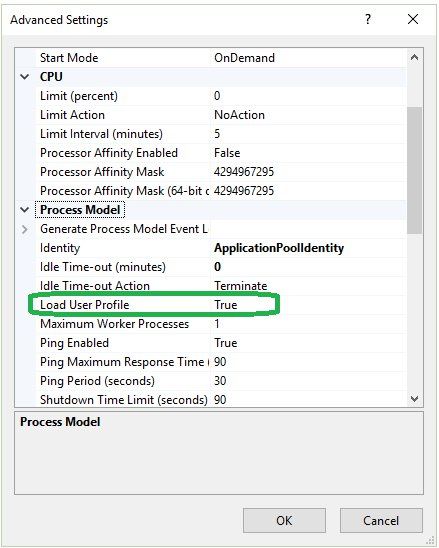Fixing OpenIddict Certificate Issues in IIS or Azure
When deploying an ABP application with OpenIddict to IIS or Azure, you may encounter issues with loading PFX/PKCS12 certificates. This article explains how to properly configure certificate loading to ensure it works correctly in these environments.
The Problem
When running under IIS or Azure, the application pool identity may not have sufficient permissions to access certificate private keys. This commonly results in errors such as:
System.Security.Cryptography.CryptographicException: Access denied.WindowsCryptographicException: Access is denied.System.Security.Cryptography.CryptographicException: The system cannot find the file specified.
The Solution
Using AddDevelopmentEncryptionAndSigningCertificate
For development environments using DevelopmentEncryptionAndSigningCertificate, you must configure the application pool to load a user profile.
Note: We strongly recommend using
DevelopmentEncryptionAndSigningCertificateonly in development environments. For production, always create and use a separate certificate.

Using AddProductionEncryptionAndSigningCertificate
The ABP OpenIddict module provides an AddProductionEncryptionAndSigningCertificate extension method. By default, the template project attempts to load an openiddict.pfx certificate in production environments.
To ensure proper certificate loading in IIS or Azure, you need to specify appropriate X509KeyStorageFlags when calling this method:
public override void PreConfigureServices(ServiceConfigurationContext context)
{
var hostingEnvironment = context.Services.GetHostingEnvironment();
if (!hostingEnvironment.IsDevelopment())
{
PreConfigure<AbpOpenIddictAspNetCoreOptions>(options =>
{
options.AddDevelopmentEncryptionAndSigningCertificate = false;
});
PreConfigure<OpenIddictServerBuilder>(serverBuilder =>
{
var flag = X509KeyStorageFlags.MachineKeySet | X509KeyStorageFlags.EphemeralKeySet;
serverBuilder.AddProductionEncryptionAndSigningCertificate("openiddict.pfx", "YourCertificatePassword", flag);
});
}
}
Understanding X509KeyStorageFlags
The configuration uses two important flags:
X509KeyStorageFlags.MachineKeySet: Specifies that the key belongs to the local computer key store, binding the key pair's lifecycle to the computer rather than a specific user.X509KeyStorageFlags.EphemeralKeySet: Indicates that the key will be stored only in memory and not persisted to disk or key store, enhancing security for runtime-only certificate requirements.
Using these flags in combination helps prevent permission-related issues in IIS and Azure environments.
Troubleshooting Guide
If you continue to experience issues, verify the following:
- Confirm that the certificate password is correct
- Verify that the
openiddict.pfxfile exists in your deployment - Ensure the certificate is valid - you can generate a new one using:
dotnet dev-certs https -v -ep openiddict.pfx -p YourCertificatePassword - Check the stdout logs for related errors (See how to get stdout-log)






























































Comments
Jake Chu 31 weeks ago
事實上對於正式環境 Azure App Service 需要設定環境變數 基本層以上可以上傳憑證後加上此設定讀取對應指紋憑證 WEBSITE_LOAD_CERTIFICATES=* 共用和免費層只能使用這個設定 WEBSITE_LOAD_USER_PROFILE=1 並且在過期時需要手動上傳新憑證並更新指紋到 Auth, API, Web 如果維護三個專案則需要更新9次 憑證如果不同則需要在三個不同時間處理 參照 jakeuj點com/ci-cd.html